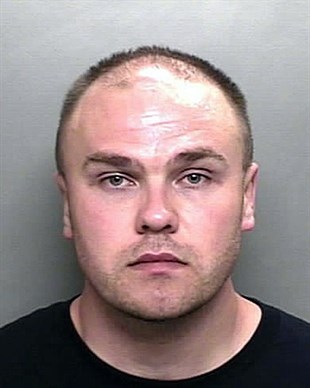
Rory Richard Francis Feeney, 31, was sentenced to 45 months in jail for robbing a Kelowna bank in 2014.
Image Credit: Canada's Most Wanted
July 08, 2015 - 1:46 PM
"AT WHAT POINT IS THE COURT TO SAY 'TALK IS TALK?'"
KELOWNA – A Supreme Court judge ignored a career criminal's assertion that he was finally ready to change.
Rory Richard Francis Feeney, 31, was on parole for a prior robbery conviction and living in a Kelowna halfway house last December when he signed himself out, saying he was going to get groceries.
His defence lawyer, Alexander Watt, said in Kelowna court today, July 8, rather than go shopping, he and his brother spent the afternoon doing crystal meth and cocaine. At 5:20 p.m. Feeney walked through the front doors of the Toronto Dominion bank on Ellis St. and told the bank manager “this is a robbery.”
“I’m not joking, go get me one thousand dollars.”
The manager handed him a bag with $350 in cash and a GPS tracking device inside and Feeney fled on foot. He ditched the device and police were unable to locate him.
The next day, on Dec. 18, just before 2:30 p.m., police received a phone call from an employee at the halfway house informing them Feeney was there and wanted to turn himself in.
He was arrested and charged with one count of robbery and has been in custody ever since. He pleaded guilty earlier this year.
Feeney has an extensive criminal history, including 27 convictions as an adult – mostly drug related – and six offences as a youth. His most recent conviction was April 30, 2013 for robbery, the conviction for which he was on parole the day he robbed the bank in Kelowna.
A pre-sentence report characterized him as remorseless and volatile, with an entrenched criminal attitude and belief. While in custody, his behaviour was described as “extremely poor” and he was frequently belligerent and disruptive during group therapy sessions. The report also says he participated in a prison riot while in custody and in 2004 members of an Emergency Response Team were called after he threatened to kill a correctional staff member.
Due to his poor record of treatment, Crown lawyer Kurt Froehlich asked Justice Allan Betton for a sentence of four to six years in jail.
“Although there was no violence, threat or weapon used, the bank tellers were exposed to the potential for harm,” he said. “There was no way for them to know if he was carrying a weapon. The bank tellers are in a vulnerable position in the bank.”
Watt said because Feeney turned himself in and was finally starting to accept he needed help with his addictions, a sentence of 30 months was sufficient.
“You’re not going to deter an addict by saying you’re going to send him to jail for five years,” he said. “The only thing that’s going to save Mr. Feeney is that he recognizes how sick he is and decides to finally do something about it. That’s exactly what he was finally doing until, unfortunately, his disease kicked in again. He went out and committed this offence.”
Justice Betton called his behaviour typical of a drug addict.
“There is no real indication he’s endorsing fixing the problem. At what point is the court to say talk is talk? Until you show something for it, time’s run out.”
He was sentenced to 35 months in addition to time already served.
To contact the reporter for this story, email Adam Proskiw at aproskiw@infonews.ca or call 250-718-0428. To contact the editor, email mjones@infonews.ca or call 250-718-2724.
News from © iNFOnews, 2015